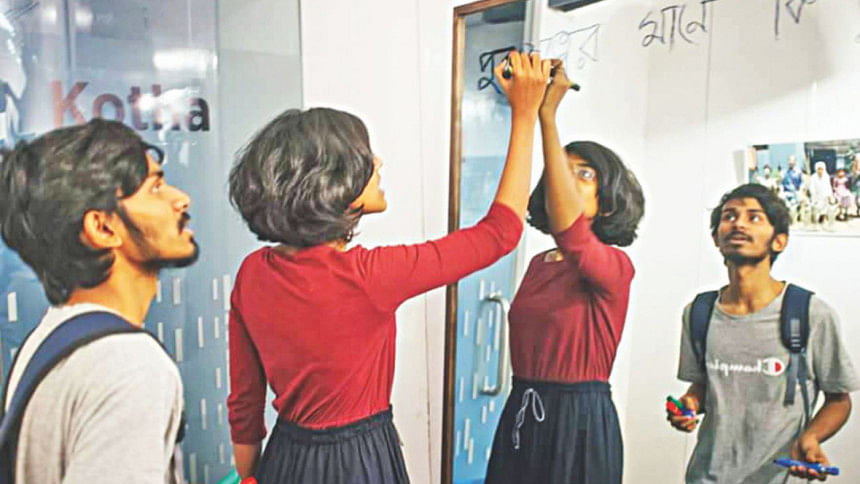The Masculinity Project - Opening up dialogues about men

'The Masculinity Project' is a series of photo narratives brought together by Saad Adnan Khan and Kazi Tahsin Agaz Apurbo with the aim to highlight the diverse and nuanced meanings of masculinity in Bangladesh by asking a seemingly simple question: "What does it mean to be a man?" In the process of doing so, they have also attempted to actively engage men on issues such as gender, sex and sexuality. The photo narratives were presented at a recent exhibition at EMK Centre in Dhaka from February 27 to March 10. A dialogue session was hosted on February 29.
Saad Adnan Khan is a researcher with an academic background in gender and intersectionality studies while Kazi Tahsin Agaz is a photojournalist at The Daily Star. The duo worked for a year to bring together the photo narratives, conducting interviews of men across Bangladesh.
The visual impact the photos create reflects the idea that there is no fixed definition of what it means to be a 'man'. The men in each photo had been given the full freedom to choose how they'd like to be portrayed and as a result, each picture itself forms a window to their self-identification. As the visitors take in each image and read the corresponding narratives, it creates a clear idea of how different individuals shape and reconstitute the ideals of masculinity. To construct an all-inclusive picture, the photo-narratives featured men from various social classes, occupations, educational backgrounds, sexualities, ages and religious beliefs. However, the audience was left to construct their views of each men and their opinions without being given a name to put to each face.
Several narratives highlighted cases we rarely consider. Under the photograph of a Buddhist monk, the narrative read, "As a man, I try and work for my own sustenanace and emancipation. I often wonder if I'm fulfilling my duties and working for my goals as a monk. I could never have the materials a person usually wants in soceity, for which I grew up and established myself in my own ways. I live outside the material world, for which I am not like other men, and neither do I have the things they possess. Moreover, I don't understand and know a lot of things about the mainstream society."
The reality of what it is like to have a body biologically termed as 'female' but identifying as a male was brought up in another narrative. Another narrative brought up the struggles of being a transgender man.
The findings of the project have been used to develop a flagship course on men, masculinity, and sexual and reproductive health rights at James P Grant School of Public Health, BRAC University. The course has been designed for students, activists, development practitioners and researchers. It has also been presented in the form of dialogues at various institutions for students.
As Saad said, "I think the project is unique because it explores masculinity from different perspectives, and not just views men as oppressors. That leads to some nuanced and critical feminist dialogues. We want to, however, hold the dialogues in different kinds of spaces through street exhibition and see what kind of reactions that can stir."
The project is supported by EMK Center, in collaboration with the Center of Excellence for Gender, Sexual and Reproductive Health and Rights, James P Grant School of Public Health, BRAC University.

 For all latest news, follow The Daily Star's Google News channel.
For all latest news, follow The Daily Star's Google News channel. 



Comments